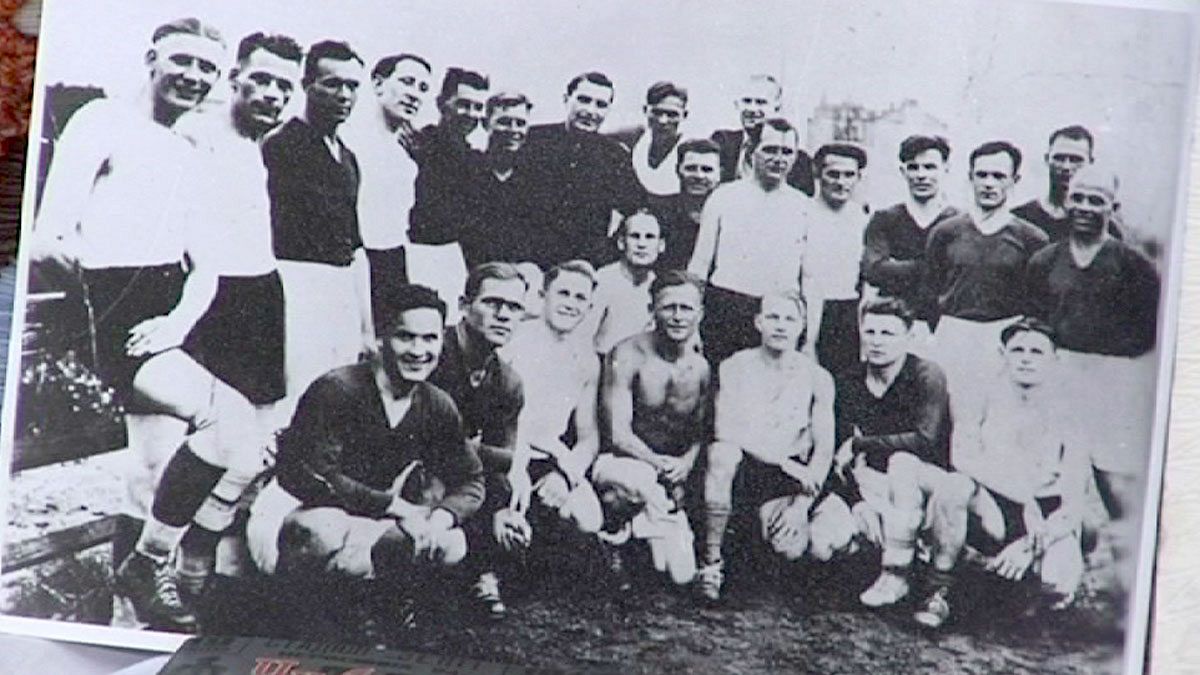The aftermath of the so-called ‘death match’ between the Kiev football team ‘Start’ and a team of Nazi soldiers during World War Two has been hotly debated for decades.
Soviet propaganda at the time insisted the Kievite team, made up of former professionals and amateurs, were shot dead by the Nazi’s, for having beaten and humiliated them on the pitch.
A Soviet monument, dedicated to the ‘death match’ stands in the Lobanovskyy stadium in Kiev.
So what really happened? Myths have fostered for years. After the collapse of the Soviet Union, Ukrainian players and their families came forward to tell their side of the story.
Vladlen Putistin, son of Mikhail Putistin, a ‘Start’ player, talks to euronews about what he remembers:
“I didn’t see that much of a harsh game. It was definitely a tense match. There were some legendary players that were kicked deliberately but I did not see it. If you take a look at the photograph, you can see that they had a picture taken after the match and everybody looked good. This proves the match went well”.
Many players came from a bread-baking plant in Kiev. Reports suggest most of the team-mates were arrested some months after the match.
Vladlen Putistin’s father was one of them: “On the 18th of August they were arrested. My father told me they were arrested. A car came up to the bread-baking plant and the Germans read their names out ‘such-and-such come out!’ and they took them to Gestapo. He spent 23 days with the Gestapo”.
The fateful game was played at Zenith stadium in Kiev but in 1981, Soviet authorities decided to change its name to ‘Start’ stadium – in memory of their home grown heroes.
One of the first among the Ukrainian historians and journalists to write objectively on the topic was Valentyn Shcherbachov. In his book, published after the fall of the Soviet Union, he reported on the manipulation of the facts.
The sports commentator explains his take on events: “As such the ‘death match’ didn’t happen. There were a series of matches in which the Kievites beat a number of teams, so in August 1942, a new law in Kiev prohibited the matches. This was so the Germans wouldn’t be discredited in the eyes of the citizens in the occupied city”.
So why had the players been detained at all and what happened to the former professionals from ‘Start’ who’d played for ‘Dynamo Kiev’?
Vladlen Putistin explains: “The Germans knew that ‘Dynamo’ was a part of ‘The People’s Commissariat for Internal Affairs’ or NKVS, so the players were interrogated. Each was in a separate cell. When the Germans couldn’t prove that they were part of any underground activity, they were sent to a concentration camp – Syrets.”
Valentyn Shcherbachov continues: “Only three players at that time were ‘Dynamo’ players. They were: Trusevich, Klymenko, and Komarov; all the others played for different teams.
“They were gathered in Kiev. Some of them were set to become ‘Dynamo’ players but weren’t at that time. In reality, there were only three “Dynamo” players. “Dynamo” was indeed the team of the NKVS but “Start” was a team of Kiev.”
Vladlen Putistin adds: “When they were arrested – the nine people – they were split into three groups. One group was shot. Tyutchev, Putistin and Komarov were in the second group. Goncharenko and Sviridovsky were working as shoemakers outside the camp.
“They were arrested but they were not put in the camp. Had they all been together they would have all been shot together.”
The players who died, Trusevych, Klymenko, Korotkitch and Kuz’menko all played for Dynamo Kiev. Though a case in 2005 in Hamburg declared there was no evidence to support their deaths were the result of beating their German opponents at football.
‘Match’, is a recent Russian cinema release, which puts its spin on events. However, some Ukrainians have deemed it offensive, for making reference to the resident’s of Kiev collaborating with Nazi’s.
